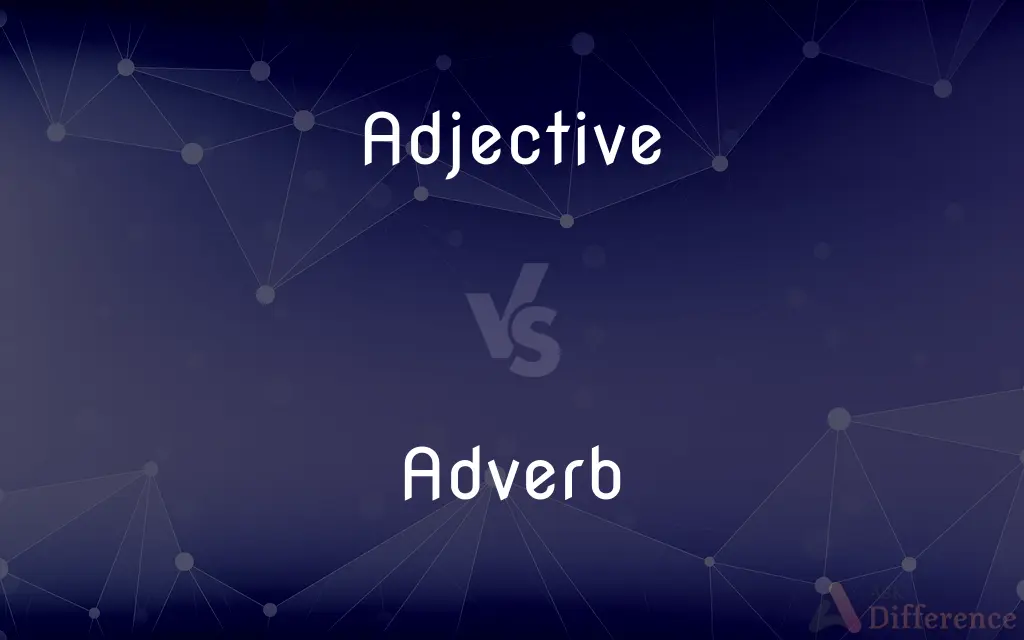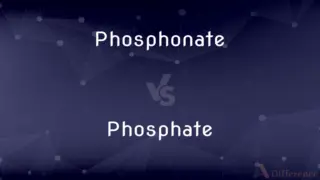Adjective vs. Adverb — What's the Difference?
By Tayyaba Rehman & Maham Liaqat — Updated on March 30, 2024
Adjectives describe nouns or pronouns, providing detail about an object, person, or situation, while adverbs modify verbs, adjectives, or other adverbs, often detailing how, when, where, or to what extent an action is performed.

Difference Between Adjective and Adverb
Table of Contents
ADVERTISEMENT
Key Differences
Adjectives are used to describe or modify nouns and pronouns, adding specificity and detail. They can tell us what kind, which one, how many, or whose about the nouns they modify. Whereas adverbs primarily modify verbs, adjectives, or other adverbs, providing additional information about how, when, where, why, or to what extent an action is performed.
An adjective can modify a noun in a sentence directly (e.g., "a red apple") or be linked to a noun by a verb (e.g., "The apple is red"). On the other hand, adverbs can modify a verb directly (e.g., "She runs quickly") or modify an adjective or another adverb (e.g., "She is very fast").
Adjectives are not used to modify verbs, which is a fundamental difference from adverbs. For example, "She sings beautiful" is incorrect, whereas "She sings beautifully" (adverb modifying the verb sings) is correct. In contrast, "beautiful song" (adjective modifying the noun song) is correct.
Adjectives usually appear directly before the noun they modify or after linking verbs such as be, seem, look, feel, etc., to describe the subject. Adverbs, however, can move around in a sentence without changing the sentence's meaning significantly, though their placement can emphasize different aspects of what's being described.
The formation of adverbs from adjectives often involves adding "-ly" to the end of an adjective (e.g., quick to quickly, happy to happily). However, there are many exceptions, and some words can function as both adjectives and adverbs without changing form (e.g., "fast").
ADVERTISEMENT
Comparison Chart
Function
Describes nouns or pronouns
Modifies verbs, adjectives, adverbs
Question Answered
What kind? Which one? How many?
How? When? Where? Why?
Example Sentences
The silent alarm.
He spoke silently.
Position
Before noun or after linking verbs
Flexible, often near the verb
Form Changes
Rarely changes form
Often ends in -ly
Compare with Definitions
Adjective
Can indicate quantity or degree.
She has several books on the shelf.
Adverb
Placement in the sentence can be flexible.
She beautifully sang the national anthem.
Adjective
Provides specifics about size, color, type.
A small, red book caught my eye.
Adverb
Often indicates manner, place, time, or degree.
The event will start soon.
Adjective
A word used to describe a noun or pronoun.
A tall building blocks the sun.
Adverb
Frequently ends in -ly, but not always.
He moved very quietly.
Adjective
Often used with linking verbs.
The sky looks blue.
Adverb
A word that modifies verbs, adjectives, or other adverbs.
She quickly ran to the store.
Adjective
Does not modify verbs.
They live in a beautiful house.
Adverb
Can modify an entire sentence.
Unfortunately, we missed the last train.
Adjective
In linguistics, an adjective (abbreviated adj) is a word that modifies a noun or noun phrase or describes its referent. Its semantic role is to change information given by the noun.
Adverb
An adverb is a word or an expression that modifies he a verb, adjective, another adverb, determiner, clause, preposition, or sentence. Adverbs typically express manner, place, time, frequency, degree, level of certainty, etc., answering questions such as how?, in what way?, when?, where?, and to what extent?.
Adjective
The part of speech that modifies a noun or other substantive by limiting, qualifying, or specifying and distinguished in English morphologically by one of several suffixes, such as -able, -ous, -er, and -est, or syntactically by position directly preceding a noun or nominal phrase.
Adverb
A word or phrase that modifies or qualifies an adjective, verb, or other adverb or a word group, expressing a relation of place, time, circumstance, manner, cause, degree, etc. (e.g., gently, quite, then, there).
Adjective
Any of the words belonging to this part of speech, such as white in the phrase a white house.
Adverb
The part of speech that modifies a verb, an adjective, another adverb, or an entire clause or sentence.
Adjective
Adjectival
An adjective clause.
Adverb
Any of the words belonging to this part of speech, such as so, very, and rapidly.
Adjective
(Law) Specifying the processes by which rights are enforced, as opposed to the establishing of such rights; remedial
Adjective law.
Adverb
(grammar) A word that modifies a verb, adjective, other adverbs, or various other types of words, phrases, or clauses.
Adjective
Not standing alone; derivative or dependent.
Adverb
(programming) In the Raku programming language, a named parameter that modifies the behavior of a routine.
Adjective
(grammar) A word that modifies a noun or noun phrase or describes a noun’s referent.
The words “big” and “heavy” are English adjectives.
Adverb
(rare) To make into or become an adverb.
Adjective
(obsolete) A dependent; an accessory.
Adverb
A word used to modify the sense of a verb, participle, adjective, or other adverb, and usually placed near it; as, he writes well; paper extremely white.
Adjective
(grammar) Adjectival; pertaining to or functioning as an adjective.
Adverb
The word class that qualifies verbs or clauses
Adjective
(legal) Applying to methods of enforcement and rules of procedure.
Adverb
A word that modifies something other than a noun
Adjective
Needing the use of a mordant to be made fast to that which is being dyed.
Adjective
Incapable of independent function.
Adjective
(transitive) To make an adjective of; to form or convert into an adjective.
Adjective
To characterize with an adjective; to describe by using an adjective.
Adjective
Added to a substantive as an attribute; of the nature of an adjunct; as, an adjective word or sentence.
Adjective
Not standing by itself; dependent.
Adjective
Relating to procedure.
Adjective
A word used with a noun, or substantive, to express a quality of the thing named, or something attributed to it, or to limit or define it, or to specify or describe a thing, as distinct from something else. Thus, in phrase, "a wise ruler," wise is the adjective, expressing a property of ruler.
Adjective
A dependent; an accessory.
Adjective
To make an adjective of; to form or change into an adjective.
Language has as much occasion to adjective the distinct signification of the verb, and to adjective also the mood, as it has to adjective time. It has . . . adjectived all three.
Adjective
A word that expresses an attribute of something
Adjective
The word class that qualifies nouns
Adjective
Of or relating to or functioning as an adjective;
Adjectival syntax
An adjective clause
Adjective
Applying to methods of enforcement and rules of procedure;
Adjective law
Common Curiosities
How do adjectives and adverbs differ in function?
Adjectives modify nouns and pronouns, while adverbs modify verbs, adjectives, and other adverbs.
What is an adjective?
An adjective is a part of speech that describes, identifies, or quantifies a noun or a pronoun.
How can you form an adverb from an adjective?
Often by adding "-ly" to the adjective (e.g., "quick" becomes "quickly"), but there are exceptions.
What is an adverb?
An adverb modifies a verb, an adjective, or another adverb, often indicating manner, place, time, or degree.
Can an adverb modify an adjective?
Yes, adverbs can modify adjectives to provide additional information about the adjective's degree or intensity.
How do adjectives change a sentence?
Adjectives add detail and specificity to nouns, enriching the sentence's meaning and imagery.
Where do adjectives usually appear in a sentence?
Before the noun they modify or after a linking verb when describing the subject.
Can adjectives ever modify verbs?
No, adjectives do not modify verbs; that is the role of adverbs.
Why is the position of an adverb in a sentence important?
The position can affect the meaning or emphasis of the sentence, highlighting different aspects of the action or quality being described.
What role do linking verbs play with adjectives?
Linking verbs connect adjectives with the subjects they describe, as in "The cake smells delicious."
How do adverbs change a sentence?
Adverbs modify how actions are performed or the degree of other modifiers, altering the perception of those actions or qualities.
Are there words that can be both adjectives and adverbs?
Yes, some words can function as both without changing form, such as "fast" and "hard".
Do all adverbs end in -ly?
No, not all adverbs end in -ly. Some, like "very" and "well," do not follow this pattern.
Where can adverbs be placed in a sentence?
Adverb placement is flexible, often near the verb but sometimes at the beginning or end of a sentence for emphasis.
Can the same word be used as both an adjective and an adverb in different sentences?
Yes, some words can function as both, depending on their role in the sentence, such as "fast" in "fast runner" (adjective) and "run fast" (adverb).
Share Your Discovery

Previous Comparison
Sparta vs. Athens
Next Comparison
Phosphonate vs. PhosphateAuthor Spotlight
Written by
Tayyaba RehmanTayyaba Rehman is a distinguished writer, currently serving as a primary contributor to askdifference.com. As a researcher in semantics and etymology, Tayyaba's passion for the complexity of languages and their distinctions has found a perfect home on the platform. Tayyaba delves into the intricacies of language, distinguishing between commonly confused words and phrases, thereby providing clarity for readers worldwide.
Co-written by
Maham Liaqat













































